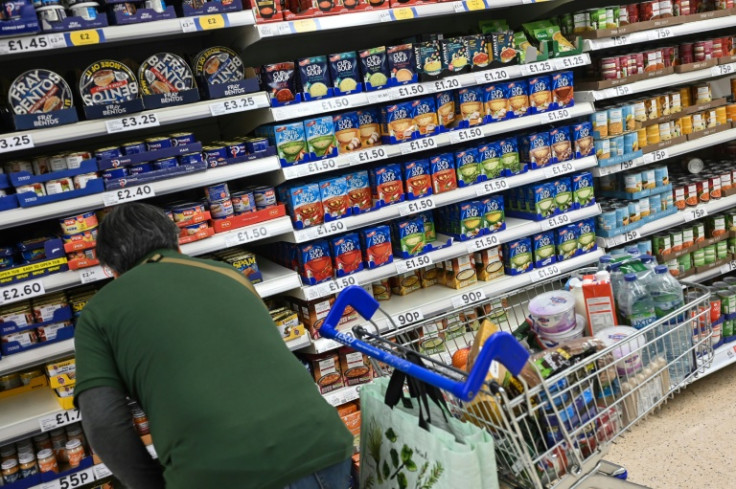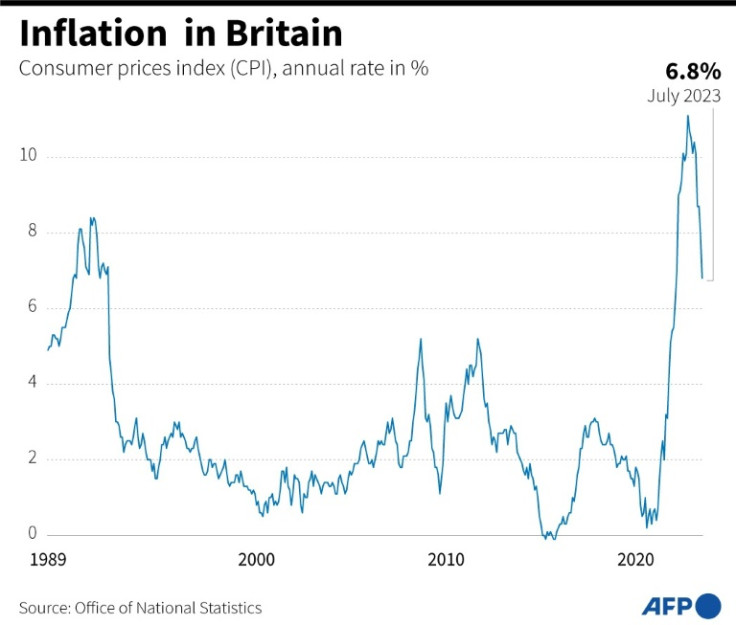UK annual inflation drops to 15-month low
Britain's annual inflation rate dropped sharply in July to a 15-month low, official data revealed Wednesday, off the back of lower energy prices and in line with economists' expectations.

Britain's annual inflation rate dropped sharply in July to a 15-month low, official data revealed Wednesday, off the back of lower energy prices and in line with economists' expectations.
The Consumer Prices Index (CPI) rose by an annual rate of 6.8 percent, down from 7.9 percent in June, the Office for National Statistics (ONS) said, easing the country's cost-of-living crisis.
July's price growth met the predictions of analysts, including the Bank of England, which had forecast the 6.8-percent rate.
It follows a bigger-than-expected drop in June, when the CPI fell 0.8 percent.
However, UK inflation has for months been the highest among G7 nations, despite the Bank of England hiking its key interest rate more than a dozen times in succession to try to tame it.
Although there was a fall in gas and electricity prices in July, food prices continued to rise, but less quickly than in the same month a year earlier.
"Inflation slowed markedly for the second consecutive month, driven by falls in the price of gas and electricity," ONS deputy director of prices Matthew Corder said.
"Although remaining high, food price inflation has also eased again, particularly for milk, bread and cereal.
"Core inflation was unchanged in July, with the falling cost of goods offset by higher service prices," he added.

Prime Minister Rishi Sunak has set a target of halving inflation through this year to around five percent by 2024.
Despite the Bank of England projecting inflation could actually rise again next month, due to the impact of public sector pay rises, Sunak insisted Wednesday's figures showed "the plan is working".
"If we stick to the plan I've set out, we'll get it done," Sunak added.
However, the Institute for Fiscal Studies economic think-tank was sceptical.
"The stubbornly high rate of price inflation for goods and services other than food and energy has put the target in jeopardy," said IFS research economist Heidi Karjalainen.
Finance minister Jeremy Hunt welcomed the latest CPI data but cautioned "we're not at the finish line" and that hitting the Bank of England's two-percent inflation target "as soon as possible" remained the overarching goal.
Data published Tuesday showed that UK unemployment increased in the three months to the end of June while wages grew at a record annual pace.

Martin McTague, national chairman of the Federation of Small Businesses (FSB), said the latest CPI statistics would renew fears of a "wage-price spiral".
"The worry now is that rising wages ignite a fresh wave of inflation in September, which will threaten the momentum from June's GDP growth," he added.
Interest rate rises since late 2021 have sparked widespread financial pain, with mortgage turmoil in particular as commercial lenders lift their own rates on home loans.
Wednesday's CPI figures may not prevent a further rate rise in late September, when the Bank of England's monetary policy committee next meets to decide whether to hike its current base rate of 5.25 percent.
© Copyright AFP 2025. All rights reserved.





















